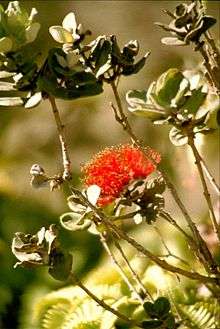Laka

In Hawaiian mythology, Laka is the name of a popular hero from Polynesian mythology. (In other parts of Polynesia she is known as Rātā, Rata, Lata, Ata, or Lasa). Lengthy legends of her exploits extend throughout the islands, and the kings of Tahiti and Hawaiʻi claimed her as their ancestor.
In the Hawaiian legend, Laka is the daughter of Wahieloa and Hina-hawa'e. She plans to sail to Hawaii to avenge the murder of her father, but her canoe-building is thwarted by the little gods of the forest. Because of her offerings to the great gods, however, they give her two outriggers that binds her together for her long voyage. She and her companions successfully steal the bones of her father from the cave of Kai-kapu.
In Hawaiʻi, Laka was also a deity identified with the hula and the red lehua blossom and is a deity of fertility.
In the story of Hiʻiaka, Laka is one of Pele's sisters and guardian of the woodland.
- Sources:
- R.D. Craig, Dictionary of Polynesian Mythology (Greenwood Press: New York, 1989), 134.
- M. Beckwith, Hawaiian Mythology (Yale U.P.: New Haven, 1948), 263-75.
Hawai'i
Four deities of this name may be distinguished:[1]
- (1) Ku-ka-ohia-LAKA, male patron of the hula-dance;[2]
- (2) Papa-o-LAKA, the 'aumakua world of Kumu-Honua;[3]
- (3) LAKA, goddess of forest growth;
- (4) LAKA, son of Wahie-loa
Marquesas
In the Marquesan version of the myth, Aka is a great voyager, grandson of Tafaki. He made a historic voyage to Aotona (Rarotonga) in what are now the Cook Islands to obtain the highly prized feathers of a red parrot as gifts for his son and daughter. The voyage was done in a great outrigger canoe named Va'ahiva that had 140 rowers. Of these, 100 die of hunger before they reach Aotona, where they capture enough parrots to fill 140 bags with their feathers.
- Sources:
- R.D. Craig, Dictionary of Polynesian Mythology (Greenwood Press: New York, 1989), 6.
- E.S.C. Handy, Marquesan Legends (Bernice P. Bishop Museum Press: Honolulu, 1930), 130-1.
Samoa
In Samoa, where this hero's name is Lata, he is a great canoe builder originally from Fiji. He builds a huge outrigger canoe on the island of Ta'u and sails to Savai'i, where a mountain is named after him. From there, he sails to Tonga where he teaches the inhabitants better ways to build canoes.
- Sources:
- R.D. Craig, Dictionary of Polynesian Mythology (Greenwood Press: New York, 1989), 134.
Tonga
In Tonga, he is Lasa, who captures the chief of the forest elves, Haelefeke, and compels him to help him build a great canoe and pilot it to Fiji. En route, they are tested by various demons.
- Sources:
- R.D. Craig, Dictionary of Polynesian Mythology (Greenwood Press: New York, 1989), 134.
- E.E.V. Collocott, Tales and Poems of Tonga (Bernice P. Bishop Museum Press: Honolulu, 1928), 15-16.
Notes
- ↑ Martha Beckwith: Hawaiian Mythology. Yale U Pr, 1940. p. 569
- ↑ Martha Beckwith : Hawaiian Mythology. Yale U Pr, 1940. p. 40
- ↑ Martha Beckwith : Hawaiian Mythology. Yale U Pr, 1940. pp. 161-162